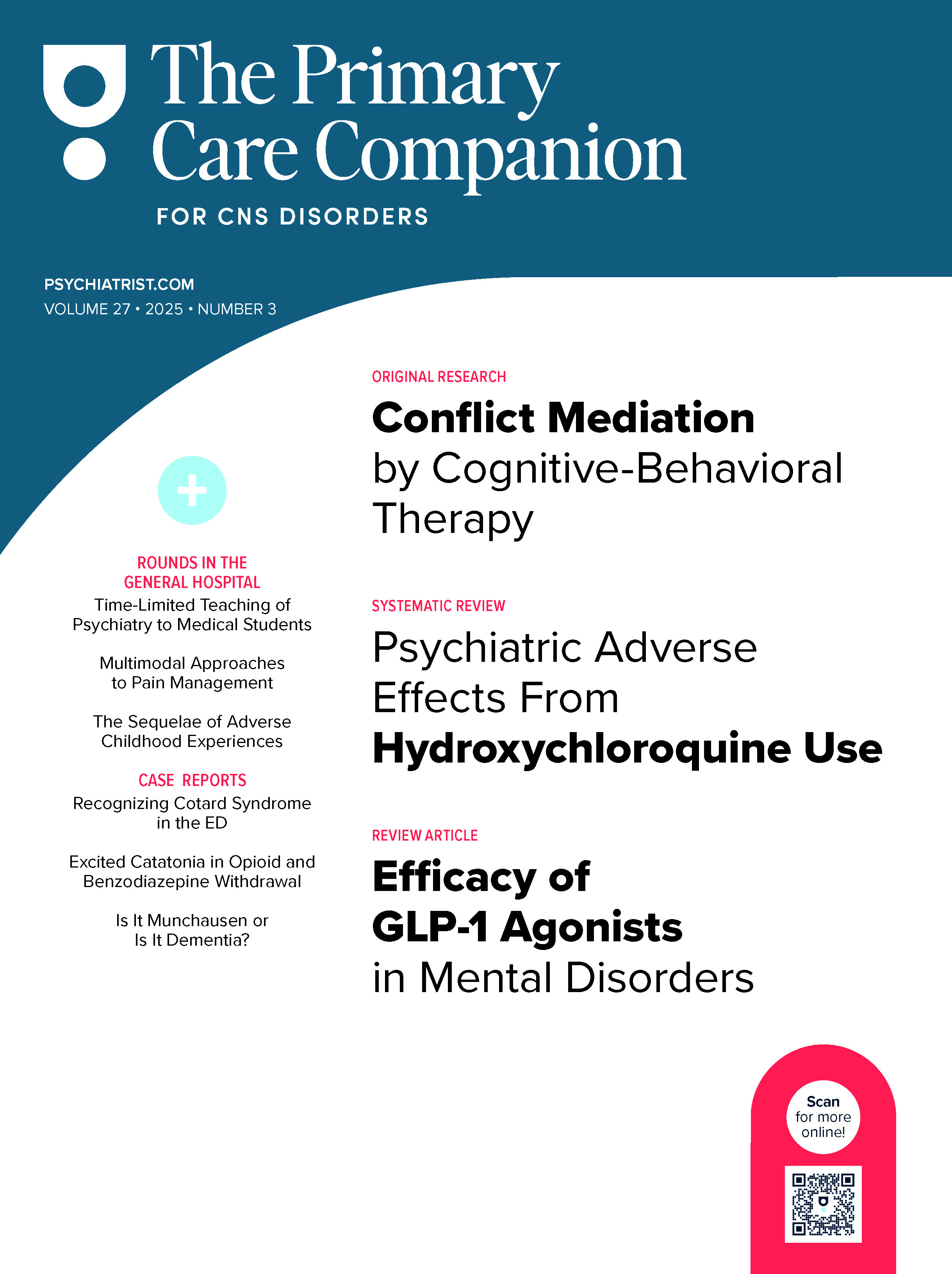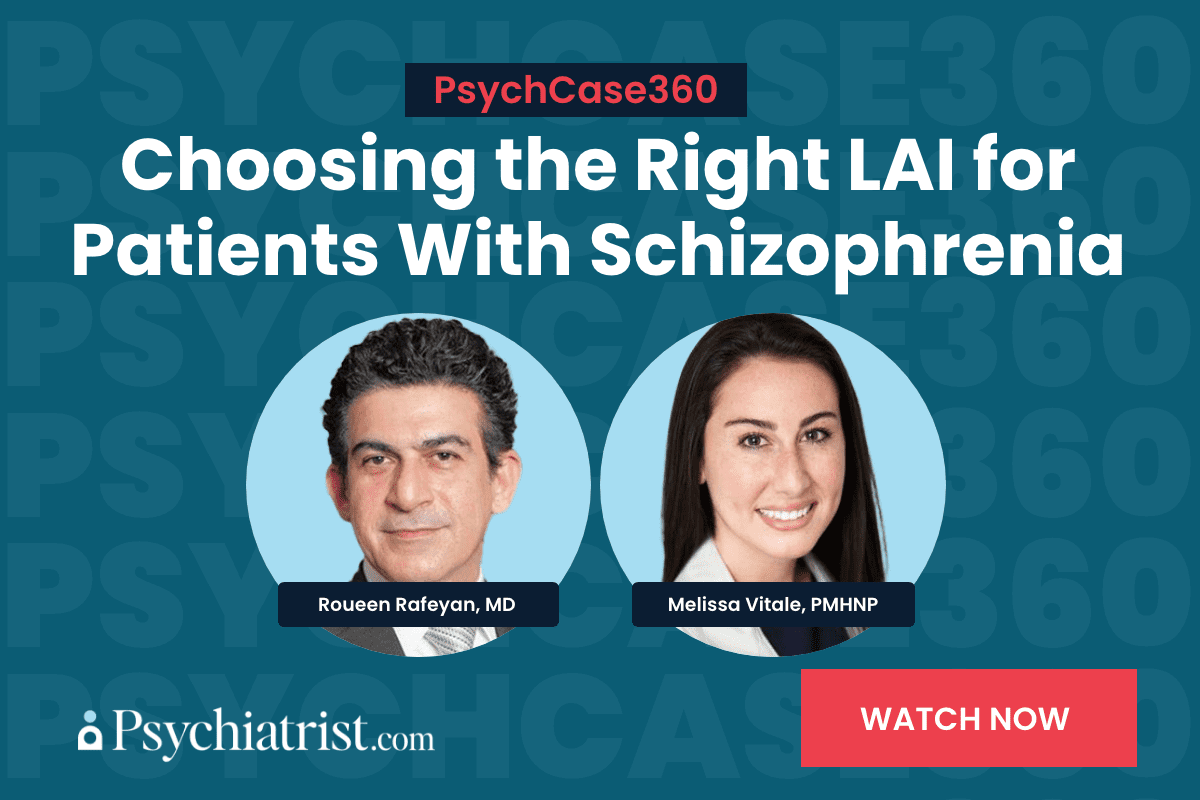Because this piece does not have an abstract, we have provided for your benefit the first 3 sentences of the full text.
In the current Diagnostic and Statistical Manual of Mental Disorders, Fifth Edition (DSM-5), catatonia is not recognized as a separate disorder but is associated with many psychiatric and medical conditions. Psychiatric causes of catatonia range from 70% to 80%, and organic causes of catatonia range from 20% to 30%. Among the psychiatric causes of catatonia, around 30% are related to mood disorders, and approximately 10% to 15% are associated with schizophrenia.’ ‹’ ‹
Catatonia in Psychotic Depression Associated With Bereavement
To the Editor: In the current Diagnostic and Statistical Manual of Mental Disorders, Fifth Edition (DSM-5), catatonia is not recognized as a separate disorder but is associated with many psychiatric and medical conditions.1 Psychiatric causes of catatonia range from 70% to 80%, and organic causes of catatonia range from 20% to 30%.2 Among the psychiatric causes of catatonia, around 30% are related to mood disorders, and approximately 10% to 15% are associated with schizophrenia.2 Catatonia is a rare condition for someone to experience with a major depressive episode with psychotic features. There is only 1 report describing a young woman with this rare phenomenon during the postpartum period.3 Otherwise, catatonia associated with bereavement has rarely been described. There are only 2 reports describing terminal cancer patients who developed brief psychotic disorder with catatonic syndromes after bereavement.4,5 Here, we report the case of a patient who developed an emergent catatonia in a major depressive episode with psychotic features associated with bereavement. The catatonia was improved by injectable diazepam and olanzapine. The psychotic depression was successively treated with mirtazapine and olanzapine.
Case report. Ms A is a 42-year-old woman without psychiatric illness history. Her fiance’s sudden death during a gastric operation was a terrible shock to her. After he died, Ms A was sad and anhedonic, with guilty delusion and suicidal ideation. She presented with intense negativism about herself and severe psychomotor retardation. She was unable to carry out daily activities without help at home and was admitted to the hospital. During hospitalization, she was mute, presented extreme loss of motor skill, held rigid poses for hours, and was not responding to any external stimuli. She required intensive nursing care and administration of intravenous fluids for nutrition and carried a urethral catheter for bladder distention. A series of examinations were arranged. The results of blood counts and serum chemistry were within normal limits. Her brain computerized tomography was normal. Drug screening tests were negative for central nervous system suppressants. After full diagnostic workup, Ms A was administered injectable diazepam 20 mg/d combined with olanzapine 10 mg/d. On the 10th day of hospitalization, the catatonia resolved gradually. While recovering from catatonia, Ms A presented with severe depression and guilty delusion (according to DSM-5 criteria). Treatment with tablet mirtazapine 60 mg/d and olanzapine 10 mg/d resulted in gradual improvement of her psychotic depression.
According to the DSM-5,1 Ms A experienced a major depressive episode with psychotic features just after her fiancé died. A period of catatonia developed insidiously during this psychotic depressive episode. A previous report described catatonia that developed during a major depressive episode with psychotic features in the postpartum period.3 The case of Ms A suggests that patients may develop catatonia in psychotic depression when they experience loss of close relatives.
Based on clinical evidence, the 2 main treatment options for catatonic depression are benzodiazepines and electroconvulsive therapy.6 Atypical antipsychotics are also utilized in certain cases, as they are thought to help manage psychotic symptoms or to be an augmentation strategy for depression.6 As in our case, injectable diazepam and olanzapine demonstrate their efficacy in treating this condition. Psychotic depression affects approximately 25% of patients who are admitted to the hospital for depression.7 Usually, combinations of antidepressants and antipsychotic medications are needed to treat this condition.8 In the case of Ms A, mirtazapine combined with olanzapine demonstrated efficacy in treating catatonia.
To our knowledge, no hypotheses have been made linking the neurobiology of psychotic depression and that of catatonic syndromes. Our case, as well as the case reported during the postpartum period,3 highlight the need for clinicians to watch for the emergence of catatonia in cases of psychotic depression, especially during the postpartum and bereavement periods.
References
1. American Psychiatric Association. Diagnostic and Statistical Manual of Mental Disorders, Fifth Edition. Arlington, VA: American Psychiatric Publishing; 2013.
2. Taylor MA, Fink M. Catatonia in psychiatric classification: a home of its own. Am J Psychiatry. 2003;160(7):1233-1241. PubMed doi:10.1176/appi.ajp.160.7.1233
3. Gervasoni N, Aubry JM. A catatonic syndrome in a postpartum major depressive episode with psychotic features. Schweiz Arch Neurol Psychiatr. 2008;159:394-396.
4. Onishi H, Onose M, Yamada T, et al. Brief psychotic disorder associated with bereavement in a patient with terminal-stage uterine cervical cancer: a case report and review of the literature. Support Care Cancer. 2003;11(7):491-493. PubMed doi:10.1007/s00520-003-0461-9
5. Onishi H, Okuno S, Yae S, et al. Brief psychotic disorder mimicking the symptoms of cerebrovascular attack evoked by symptoms that symbolized death in a patient with terminal stage stomach cancer: case report and review of the literature. Palliat Support Care. 2006;4(1):87-89. PubMed doi:10.1017/S147895150606010X
6. Daniels J. Catatonia: clinical aspects and neurobiological correlates. J Neuropsychiatry Clin Neurosci. 2009;21(4):371-380. PubMed doi:10.1176/appi.neuropsych.21.4.371
7. Schatzberg AF. New approaches to managing psychotic depression. J Clin Psychiatry. 2003;64(suppl 1):19-23. PubMed
8. Wijkstra J, Lijmer J, Burger H, et al. Pharmacological treatment for psychotic depression. Cochrane Database Syst Rev. 2013;11:CD004044. PubMed
Author affiliations: Department of Psychiatry, Tzu-Chi General Hospital (both authors) and Department of Psychiatry, School of Medicine, Tzu Chi University (Dr Shen), Hualien, Taiwan.
Potential conflicts of interest: None reported.
Funding/support: None reported.
Published online: March 12, 2015.
Prim Care Companion CNS Disord 2015;17(2):doi:10.4088/PCC.14l01725
© Copyright 2015 Physicians Postgraduate Press, Inc.
Please sign in or purchase this PDF for $40.00.




